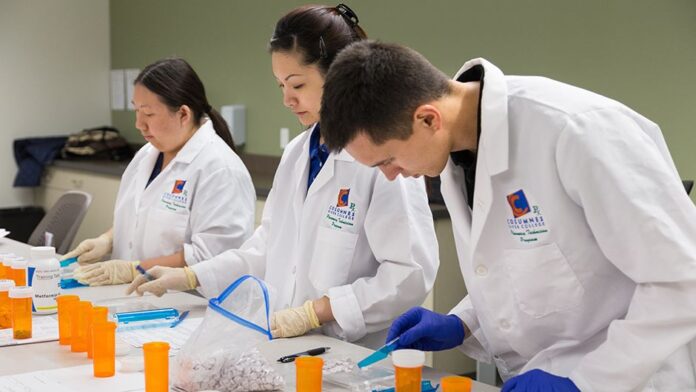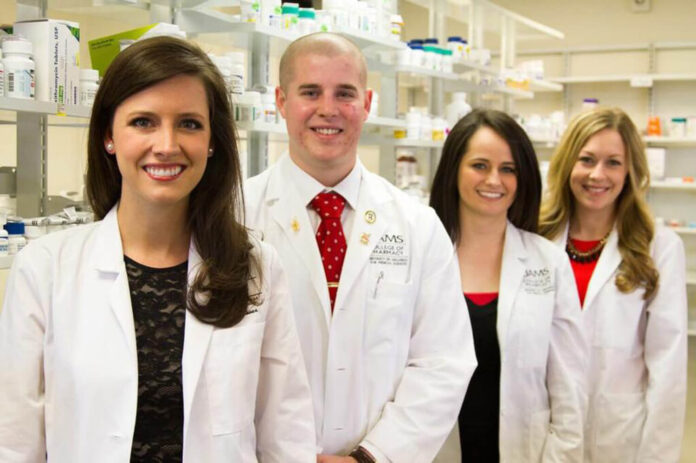Pharmacy technicians play a vital role in the healthcare system, working alongside pharmacists to provide safe and effective medication management. As students of Pharmacy technician school, they are equipped with the necessary knowledge and skills to fulfill their primary responsibilities of dispensing medications and ensuring dosage accuracy.
However, their role extends beyond these tasks, encompassing essential duties in patient care and communication.
In this article, we will explore the key responsibilities of pharmacy technicians in these areas and how their training at Pharmacy Technician School prepares them for these crucial aspects of their profession.

1. Building Rapport with Patients
One of the crucial responsibilities of pharmacy technicians is establishing a positive and empathetic rapport with patients. When patients come to the pharmacy, they may have concerns or questions regarding their medications. Pharmacy technicians should greet patients warmly, actively listen to their concerns, and provide reassurance and guidance. Building trust and creating a comfortable environment for patients can enhance their overall healthcare experience.
2. Patient Counseling and Education
Pharmacy technicians are often the first point of contact for patients seeking information about their medications. They have a responsibility to provide accurate and accessible patient counseling. This involves explaining medication instructions, potential side effects, and proper storage techniques. By offering clear and concise explanations, pharmacy technicians empower patients to make informed decisions about their health and medication regimen.

3. Medication Adherence Support
Ensuring medication adherence is crucial for patients’ health outcomes. Pharmacy technicians play a vital role in supporting patients’ adherence to medication schedules. They can provide reminders and educational materials on the importance of taking medications as prescribed. Pharmacy technicians may also collaborate with healthcare providers to identify any barriers to adherence and explore potential solutions.
4. Addressing Patient Concerns and Queries
Patients may have concerns or questions about their medications, such as drug interactions, potential allergies, or alternatives. Pharmacy technicians should be knowledgeable about common concerns and be able to address them appropriately. They may consult with pharmacists or refer patients to healthcare professionals when necessary. By addressing patient concerns promptly and accurately, pharmacy technicians contribute to patient safety and satisfaction.
5. Collaborating with the Healthcare Team
Pharmacy technicians work closely with pharmacists and other healthcare professionals to ensure seamless patient care. They assist in maintaining medication records, verifying prescriptions, and preparing medications for dispensing. Effective communication and collaboration with the healthcare team are vital for accurate medication management and avoiding errors. Pharmacy technicians must be proactive in sharing information and reporting any concerns or discrepancies.

6. Medication Safety and Quality Assurance
Patient safety is of utmost importance in pharmacy practice. Pharmacy technicians have a responsibility to uphold medication safety protocols, including verifying medication orders, checking for accuracy, and ensuring proper storage and handling of medications. They play a crucial role in quality assurance by conducting regular inventory checks, monitoring expiration dates, and reporting any issues to the pharmacist.
7. Continuous Learning and Professional Development
The field of pharmacy is constantly evolving, with new medications and technologies being introduced regularly. Pharmacy technicians have a responsibility to stay updated with the latest developments in the field. They should actively engage in continuing education programs, attend workshops, and seek opportunities to enhance their knowledge and skills. Continuous learning ensures that pharmacy technicians provide the highest standard of care to patients.
8. Handling Medication Errors and Incident Reporting
While pharmacy technicians strive for accuracy in medication management, errors can occasionally occur. In such cases, it is crucial for them to handle medication errors appropriately and report them to the pharmacist or relevant authorities. This includes documenting the incident, investigating the root cause, and implementing preventive measures to minimize the risk of future errors. By taking prompt action and engaging in incident reporting, they contribute to improving patient safety and enhancing the quality of pharmaceutical care.

9. Assisting with Medication Reconciliation
Medication reconciliation is a critical process that ensures accurate and up-to-date medication information for patients during transitions of care, such as hospital admissions or changes in healthcare settings. Pharmacy technicians play a significant role in assisting with medication reconciliation by reviewing medication lists, identifying discrepancies, and communicating with patients and healthcare providers to resolve any inconsistencies. By actively participating in medication reconciliation, they help prevent medication errors, adverse drug reactions, and potential harm to patients.
10. Assisting with Medication Therapy Management
Pharmacy technicians also play a crucial role in medication therapy management (MTM), which involves optimizing medication use and outcomes for patients. They support pharmacists in conducting comprehensive medication reviews, identifying medication-related problems, and developing appropriate intervention plans. They may assist in gathering patient information, organizing medication profiles, and documenting interventions. By actively participating in MTM, they contribute to improving medication safety, efficacy, and patient adherence.
11. Maintaining Patient Confidentiality and Privacy
Pharmacy technicians are entrusted with sensitive patient information, including medical histories, medication profiles, and personal details. It is essential for them to maintain strict confidentiality and respect patient privacy at all times. Pharmacy technician school emphasizes the importance of adhering to legal and ethical guidelines related to patient confidentiality. Technicians are trained to handle patient information securely, maintain confidentiality in verbal and written communications, and ensure the privacy of patient records. By upholding patient confidentiality, they build trust and foster a professional and ethical environment.

12. Promoting Health and Wellness Initiatives
Pharmacy technicians are increasingly involved in promoting health and wellness initiatives within the community. They may assist in conducting health screenings, providing information on preventive care measures, and offering advice on over-the-counter products, vitamins, and supplements. They may also collaborate with pharmacists and other healthcare professionals to develop educational materials, participate in health fairs, and engage in community outreach programs. By actively promoting health and wellness, they contribute to improving public health outcomes and empowering individuals to take charge of their well-being.
In conclusion, pharmacy technicians have key responsibilities in patient care and communication that go beyond dispensing medications. By building rapport with patients, providing counseling and education, supporting medication adherence, addressing concerns, collaborating with the healthcare team, ensuring medication safety, and pursuing professional development, they contribute significantly to patient well-being and overall healthcare outcomes. Their dedication and expertise make them an invaluable asset in the pharmacy setting.









